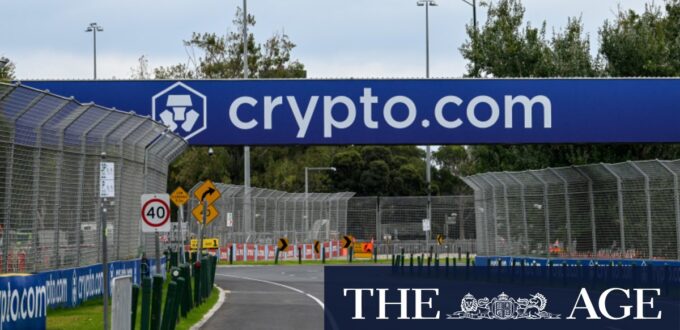If you’ve been to an AFL match this season, you’ve probably noticed them. And if you plan to watch the Australian Formula One Grand Prix when it starts next week, there’s no way you’ll be able to miss them.
Ads for cryptocurrency trading have crept into Australia’s sporting arenas, nestled alongside fast food, betting and alcohol brands.

Crypton.com signage at Albert Park’s Formula 1 track, ahead of next week’s race.Credit:Eddie Jim
The trade in digital currencies – long relegated to dark corners of the internet – is undergoing an enormous branding exercise, with hundreds of millions of dollars being poured into advertising campaigns at sporting venues and events around the world to normalise its image.
“When we connect with sport, we’re connecting with lots and lots of people at the same time,” said Steven Kalifowitz, chief marketing officer of crypto.com, the trading platform whose banners blanket parts of Melbourne’s Albert Park racetrack.
“[With sport] we’re able to introduce ourselves as a mainstream company, and a company that is legit and here to stay for a long time,” Mr Kalifowitz said.
But consumer financial advocates and anti-gambling reformists say they are alarmed by what they call the “mainstreaming” of unregulated cryptocurrency trading apps in Australia, and have raised questions about their aggressive marketing strategies.

Crypto.com advertising at the MCG at the AFL season opener in March.Credit:Eddie Jim
The past 12 months have seen many major Australian sporting codes turn to cryptocurrency and non-fungible tokens (digital memorabilia, which like cryptocurrencies are also powered by blockchain technology) as a new source of revenue.
In February, the NRL announced a three-year deal with Brisbane-based crypto exchange Swyftx, while the largest Australian-based exchange, CoinSpot, has its brand emblazoned on the jerseys of the AFL’s Western Bulldogs.
Tennis Australia for the first time sold non-fungible tokens, or NFTs, at this year’s Australian Open, while Cricket Australia has been in months-long talks about a NFT platform of their own.

Crypto exchange CoinSpot branding emblazoned on the Western Bulldogs jerseys.Credit:AFL Photos via Getty Images
The Singapore-based Crypto.com has embarked on an enormous global campaign to become the world’s most well-known crypto exchange. Last year, the app paid more than $US700 million ($A931 million) to secure the name of the Los Angeles arena formerly known as Staples Centre.
It was one of a number of crypto exchanges to shell out millions on US Superbowl ads in February, while the app was one of four major sponsors of last week’s Oscars ceremony. Actor Matt Damon is the face of their TV and social commercials and they have signed major deals with Formula 1, UFC and the NBA.
Next week’s grand prix is the latest foray for the app into the Australian sporting arena, following the company’s announcement in January of a five-year major partnership deal with the AFL.
The $25 million agreement includes on-ground advertising and sponsorship of five specific teams: Richmond Tigers, Gold Coast Suns, Adelaide Crows, Greater Western Sydney Giants and the Fremantle Dockers.
Loading
The company wouldn’t be drawn on what other sporting codes they’re eying off, but the fact they are opening an Australian headquarters in Melbourne this year suggests plans for more expansion.
Chief executive of the Consumer Action Law Centre, Gerard Brody, said he was concerned about the way companies were trying to appeal to mainstream audiences who may have little understanding of cryptocurrency.
“It’s pretty irresponsible,” he said. “We would expect any sort of investment product or company to be ensuring its investors understand the risks appropriate to the product.”
Professor of Finance at University of Technology Sydney, Talis Putnins, said there were many legitimate investment opportunities with cryptocurrency, but warned consumers needed to be well aware of currency volatility, and its susceptibility to hacking, thefts, frauds and scams.
Loading
“Bitcoin [for example] is five times more volatile than the Australian stock market [ASX 200],” he said. “What’s more, bitcoin isn’t even the most volatile cryptocurrency – many of the newer and smaller coins are even more volatile.”
Alliance for Gambling Reform’s Reverend Tim Costello, who has previously labelled the AFL’s partnership with crypto.com as “corrupting and compromising the sport”, said his organisation believed trading apps were similar to sports-betting apps.
“Speculation on a currency that isn’t backed by any physical assets that jumps around with great volatility we see is quite parallel to gambling addiction, gambling apps and ads,” he said.
Crypto.com’s Mr Kalifowitz, however, rebuffed the analogy.
“We’re a financial services company – nothing about crypto is like gambling, other than perception of those who are not in the market,” he said.
Nonetheless, governments around the world have begun moves to regulate and restrict the advertising of cryptocurrency trading.
The UK advertising regulator has this month put more than 50 companies that have promoted cryptocurrencies on notice ahead of an impending clampdown on “misleading and irresponsible crypto ads”. In January Spain moved to rein in advertising, especially from influencers promoting specific stocks.
There are currently no specific rules in Australia on where and how cryptocurrency businesses can advertise, besides general rules against misleading and deceptive conduct.
The federal government is in the process of establishing new regulations which will affect digital exchanges and other crypto businesses by introducing market licences similar to those imposed on the Australian Stock Exchange.
Mr Kalifowitz said his company whole-heartedly welcomed regulation.
“We want the industry being regulated because we think it will bring more clarity for everyone,” he said.
The Australian Grand Prix Corporation, which is responsible for staging Melbourne’s F1 race, reports to Tourism and Major Events Minister Martin Pakula.
Asked about the appropriateness of such advertising at an event subsidised by the state government, a spokesman for the minister said: “Signage placement at the grand prix is at the discretion of the Australian Grand Prix Corporation.”
The Morning Edition newsletter is our guide to the day’s most important and interesting stories, analysis and insights. Sign up here.
Most Viewed in National
Loading

No Comments Yet